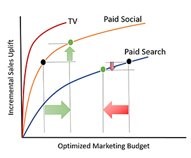Marketing and Consumer Privacy
Every other month marketers lose some tracking capability to new privacy rules (see iOS 15), updates and Apple Mail privacy. The Identifier for Advertisers (“IDFA”) allows advertisers to track interactions with mobile apps to enable personalization. Many tools, such as Facebook ad manager, now under-reports on metrics such as conversions, rendering CPA, ROMI, and other metrics unreliable. Let’s face it: making the opt-in for tracking so visible was a huge blow to marketing’s ability to track consumer behavior. And the storm is not over!
-
Google announced that third party cookies will be phased out in 2023
-
Europe passed the GDPR regulation
-
California issued the California Consumer Privacy Act (CCPA)
-
Bipartisan support of much stricter privacy laws in Washington D.C.
Measuring Marketing Effectiveness
If you are a marketer and your organization invests heavily in digital marketing, you most likely rely on some form of attribution modeling to measure your marketing channel’s effectiveness and calculate Return on Marketing Investment (ROMI).
Usually conversions are seen as “incremental sales” generated by the marketing channel. I would like a clarification: conversions are NOT incremental sales, since deterministic attribution is extremely biased towards last touch attribution (the marketing tactic that corresponds to the last touchpoint gets credit for the entire conversion).
But what would you do if you were to lose, partially or fully, the ability to perform deterministic attribution? How would you know which marketing tactics are working and what’s not working?
IDFA Alternatives
Fortunately, there are other tools that can be used to substitute deterministic attribution, or at least to complement whatever attribution capabilities will be left. One such tool is Marketing Mix Modeling (MMM). To learn more about how these two methodologies compare, check out my blog: Marketing Mix, Attribution; Both, or Neither?
Benefits of Marketing Mix Modeling
Marketing Mix Modeling (MMM) is a well-known and widely used statistical methodology to estimate the impact of various marketing tactics sales. There are advantages of enabling marketing mix modeling over attribution:
-
Does not use Personally Identified Information (PII)
-
Is more accurate because it does not bias last touch
-
Includes offline channels
-
Estimates diminishing yields at different levels of spend, which enables marketers to pinpoint the optimal level of marketing spend

The Adoption of Marketing Mix Modeling
Virtually all fortune 500 companies use marketing mix modeling; the scale of adoption for medium-large companies remains somewhat low. The likely reason is misconceptions around MMM:
-
reputation for being extremely expensive
-
complex to design and update
-
slow in responding to sudden changes in consumer behavior
This reputation is not completely unjustified, but also not fully deserved. First, by leveraging boutique analytics firms with low overhead, the cost of an MMM can decrease by as much as 60%. Second, there is technology and infrastructure to create models that regularly update the results as often as once a week. Finally, and last, having a dedicated team of statisticians or mathematicians that design the model AND generate the outputs, guarantee you will obtain reliable, machine learning-backed insights.
Empower Marketing Teams Post-IDFA
Dunn Solutions’ machine learning consultants have executed many Marketing Mix Models to gain more meaningful insights into your marketing effectiveness with first party data while honoring privacy permissions. Dunn Solutions’ analytics consultants will provide a no-charge, no-commitment evaluation of your data and explore opportunities to design the correct approach to maximize you Return on Marketing Investment!
Contact Us Today to Learn More!




